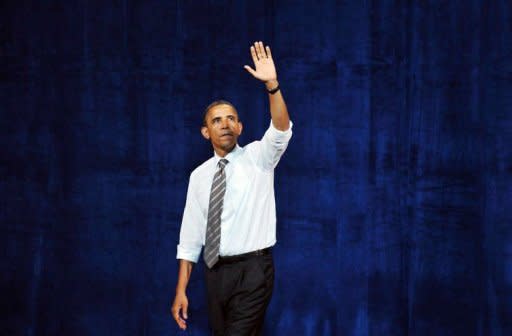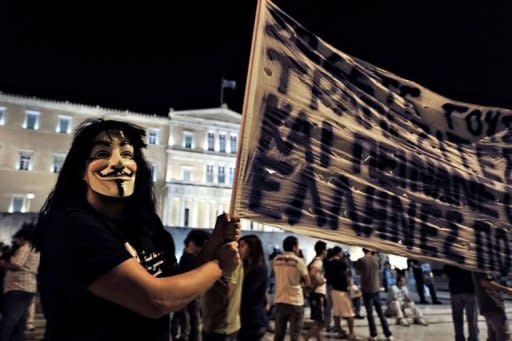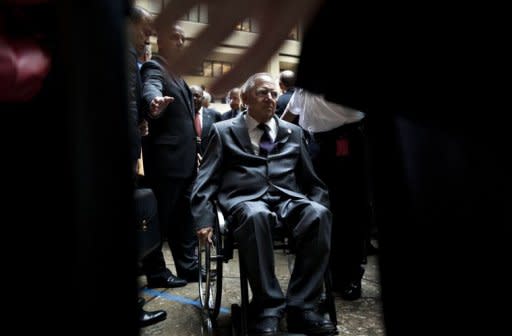Europe 'scaring' Obama as global recession lurks
Europe's failure to tackle crippling Greek debt is "scaring the world," US President Barack Obama warned as Germany stoked fears Tuesday of a worldwide plunge back into recession. Obama spoke out after Berlin shot down moves to boost debt rescue funding, bursting renewed optimism on markets amid global pressure for the eurozone to stave off recession. Europe "never fully dealt with all the challenges that their banking system faced," Obama said late Monday, as prospects of a new debt transfusion evaporated amid Germany's refusal to up guarantees covering debt-laden euro currency partners. "It's now being compounded with what's happening in Greece," Obama said. "So they're going through a financial crisis that is scaring the world." The European Union sent mixed messages on Monday about the way forward. Economic Affairs commissioner Olli Rehn said the 440-billion-euro ($590 billion) European Financial Stability Facility, the cornerstone of a second Greek bailout trapped in parliamentary argument, should be given "greater strength." His spokesman Amadeu Altafaj even added that discussions following intense debt diplomacy in Washington were now centred on an "increase of the means at the EFSF's disposal." Within hours however, German Finance Minister Wolfgang Schaeuble insisted there was no plan to boost the fund's actual size. "We are giving it the tools so it can work if necessary," Schaeuble said, referring to the new powers allowing it to lend to countries such as Italy even before they hit cashflow crises. "Then we will use it effectively -- but we do not have the intention of boosting its volume," he underlined. Schaeuble's blunt reaction comes ahead of a parliamentary vote in Germany Thursday to ratify the changes to the fund's operating scope, agreed in principle in July. Germany is continental Europe's de facto paymaster, expected to provide the lion's share of any increased loans, but German Chancellor Angela Merkel is facing increasing discontent inside her own party. Especially worryingly for Obama, Schaeuble's intervention slowed the momentum built up during intense debt diplomacy in Washington over the weekend. There, the International Monetary Fund, the United States and other G20 economies pushed Europe to ring-fence the really big risks such as Italy -- in a concerted effort to prevent the world slipping into a fresh downturn. "We are thinking about the possibility of giving the EFSF greater leverage, to give it greater strength," Rehn had said. But just eight of the 17 eurozone states have so far ratified the new EFSF powers agreed at a July summit, which also opted for a 159-billion-euro successor to last year's failed 110-billion-euro Greek rescue. The fund has already been tapped by Ireland and Portugal, so investors want to be convinced that Italy will not need help further down the line. Germany opposes any increase in the size of the government "guarantees" that give the EFSF its borrowing clout. The hope for non-European leaders is that Berlin might back an alternative measure enabling the fund to raise more "capital," in the interests of wider financial stability. Speculation suggests the fund's reach, even on the same guarantees, could ultimately stretch as high as three trillion euros. Austrian Finance Minister Maria Fekter however said taxpayers should be spared any further pain. "It would be premature to think the solution is ready," RBC FX Strategy analysts concluded. In Slovakia, politicians are blocking the measure, arguing that borrower countries should have to deposit "state-held" assets as collateral. Greece meanwhile is still waiting for a date for the return of EU and IMF auditors, which means eight billion euros in blocked loans may now have to be considered by EU leaders at an October 17-18 summit in Brussels. Greece has yet to convince its creditors it can fix the hole in its finances, or successfully implement the state sell-offs its bailout partners are insisting on, before a cashflow crunch in mid-October.




